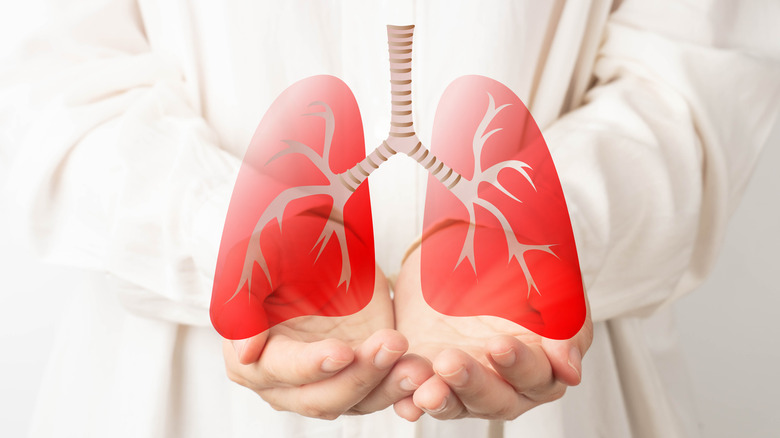Here's What's Really Causing Your Wheezing Cough
A wheezing, or whistling, sound when you cough is usually the result of restricted, inflamed, or blocked airways caused by viral or bacterial infections. These conditions can have common causes, like a cold or allergies, per Medical News Today. A cold can last up to 10 days and usually has other symptoms that include congestion, a runny nose, a sore throat, and fatigue, according to Healthline. Allergies have symptoms similar to a cold that include coughing, itchy eyes, a runny nose, sneezing, and headaches (via Asthma and Allergy Foundation of America).
Whooping cough and respiratory syncytial virus (RSV) are two other conditions that can cause a wheezing cough. Whooping cough is a respiratory infection while RSV is a virus. Generally, children are more likely to develop both of these conditions. GERD, or gastrointestinal reflux disease, is seen more in adults, and it can cause a wheezing cough as stomach acids try to back up into the esophagus (via Healthline).
Other conditions behind a wheezing cough
More serious health conditions, such as asthma, might be behind a wheezing cough. Asthma causes a mucus buildup in the throat, which makes it swell or narrow. Many things can trigger asthma symptoms, including an allergy to pollen, mold, or animal dander, according to the American College of Allergy, Asthma, and Immunology. Cardiac asthma, which isn't asthma at all, is caused by left-sided heart failure, and it can lead to a wheezing cough (via Verywell Health). Pneumonia is another cause of a cough that might be accompanied by wheezing and mucus, per the American Lung Association.
Chronic obstructive pulmonary disease (COPD) is a condition that blocks airflow from your lungs that is caused primarily by smoking tobacco, according to Mayo Clinic. Two conditions that play a part in COPD are bronchitis and emphysema. Chronic bronchitis is the result of inflamed bronchial tubes, and emphysema is the result of damaged airways collapsing. If you cough up mucus, experience shortness of breath, or a fever, you could have bronchitis, per Cleveland Health Clinic. Signs of emphysema include a tight feeling in the chest, blue lips or nails, fatigue, and headaches (via WebMD).


